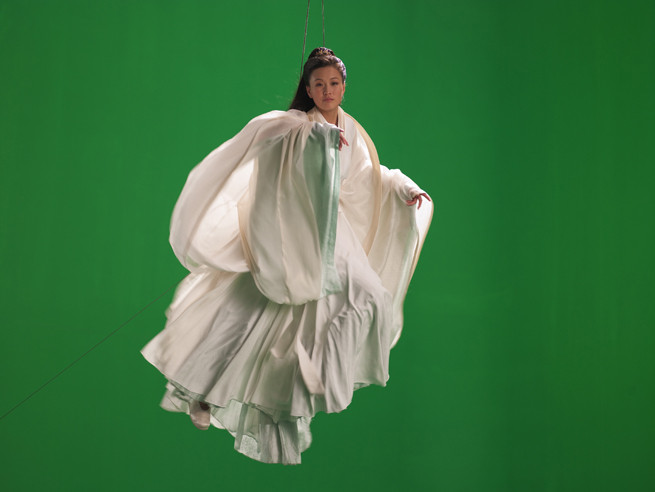Isaac Julien
18 Mar - 30 Apr 2011

© Isaac Julien
Green Screen Goddess (Ten Thousand Waves), 2010
Endura Ultra photograph
70.87 x 94.49 inches
180 x 240 cm
Green Screen Goddess (Ten Thousand Waves), 2010
Endura Ultra photograph
70.87 x 94.49 inches
180 x 240 cm
ISAAC JULIEN
Ten Thousand Waves
18 March - 30 April 2011
"Ten thousand waves take us to the shore / Home will arrive under our feet"
– Wang Ping, "The Great Summons"
Isaac Julien's Ten Thousand Waves photographs, on view at Metro Pictures, are the photographic component of his nine-screen film installation of the same name, which was recently presented at the Sydney Biennial, the Hayward Gallery in London, and the Bass Art Museum in Miami Beach. Julien's large-scale photographs were produced while making the encompassing installation, and are meticulously staged in the dramatic settings constructed for the film. Photographed throughout rural and urban China, the series resulted from the artist's deep immersion in the nation's culture following the 2004 Morecambe Bay tragedy, in which 23 Chinese cockle-pickers died one evening in northwest England, drowned by the incoming tide.
The Chinese goddess Mazu, renowned for leading lost fishermen to safety and portrayed by Chinese screen icon Maggie Cheung, appears in many of the works in disparate places and times, mirroring the nonlinearity of Julien's film. The artist worked extensively in the rural Guangxi province to produce many of the images, as well as at sites in Shanghai, from the legendary Shanghai Film Studio (where numerous classics of early Chinese cinema were made) to a skyscraper hotel room in the center of the rapidly changing city.
"The project became a kind of search for me," Julien says in an interview in the show's catalogue, published by Metro Pictures and Victoria Miro Gallery. "I wanted to look at Chinese culture and an ongoing dialogue with the aesthetic practices of that culture and find my own contribution to that exchange." His resulting works constitute a mesmerizing hybrid form, a mixture of a travelogue, a kaleidoscopic portrait of Chinese history, and a filmic essay on contemporary networks of human and artistic migration.
Isaac Julien lives and works in London. His work is in the collections of the Art Institute of Chicago, the Centre Pompidou, the Hirshhorn Museum and Sculpture Garden, the Guggenheim, and SFMOMA. Julien participated in the 17th Sydney Biennial (2010), the Venice Biennale (2009), the 7th Gwangju Biennial (2008), Prospect 1 in New Orleans (2008), and the 2004 Berlin Biennial. He has also directed acclaimed documentaries, including Derek (2008), Frantz Fanon, Black Skin White Mask (1996), and Looking for Langston (1989).
Ten Thousand Waves
18 March - 30 April 2011
"Ten thousand waves take us to the shore / Home will arrive under our feet"
– Wang Ping, "The Great Summons"
Isaac Julien's Ten Thousand Waves photographs, on view at Metro Pictures, are the photographic component of his nine-screen film installation of the same name, which was recently presented at the Sydney Biennial, the Hayward Gallery in London, and the Bass Art Museum in Miami Beach. Julien's large-scale photographs were produced while making the encompassing installation, and are meticulously staged in the dramatic settings constructed for the film. Photographed throughout rural and urban China, the series resulted from the artist's deep immersion in the nation's culture following the 2004 Morecambe Bay tragedy, in which 23 Chinese cockle-pickers died one evening in northwest England, drowned by the incoming tide.
The Chinese goddess Mazu, renowned for leading lost fishermen to safety and portrayed by Chinese screen icon Maggie Cheung, appears in many of the works in disparate places and times, mirroring the nonlinearity of Julien's film. The artist worked extensively in the rural Guangxi province to produce many of the images, as well as at sites in Shanghai, from the legendary Shanghai Film Studio (where numerous classics of early Chinese cinema were made) to a skyscraper hotel room in the center of the rapidly changing city.
"The project became a kind of search for me," Julien says in an interview in the show's catalogue, published by Metro Pictures and Victoria Miro Gallery. "I wanted to look at Chinese culture and an ongoing dialogue with the aesthetic practices of that culture and find my own contribution to that exchange." His resulting works constitute a mesmerizing hybrid form, a mixture of a travelogue, a kaleidoscopic portrait of Chinese history, and a filmic essay on contemporary networks of human and artistic migration.
Isaac Julien lives and works in London. His work is in the collections of the Art Institute of Chicago, the Centre Pompidou, the Hirshhorn Museum and Sculpture Garden, the Guggenheim, and SFMOMA. Julien participated in the 17th Sydney Biennial (2010), the Venice Biennale (2009), the 7th Gwangju Biennial (2008), Prospect 1 in New Orleans (2008), and the 2004 Berlin Biennial. He has also directed acclaimed documentaries, including Derek (2008), Frantz Fanon, Black Skin White Mask (1996), and Looking for Langston (1989).
